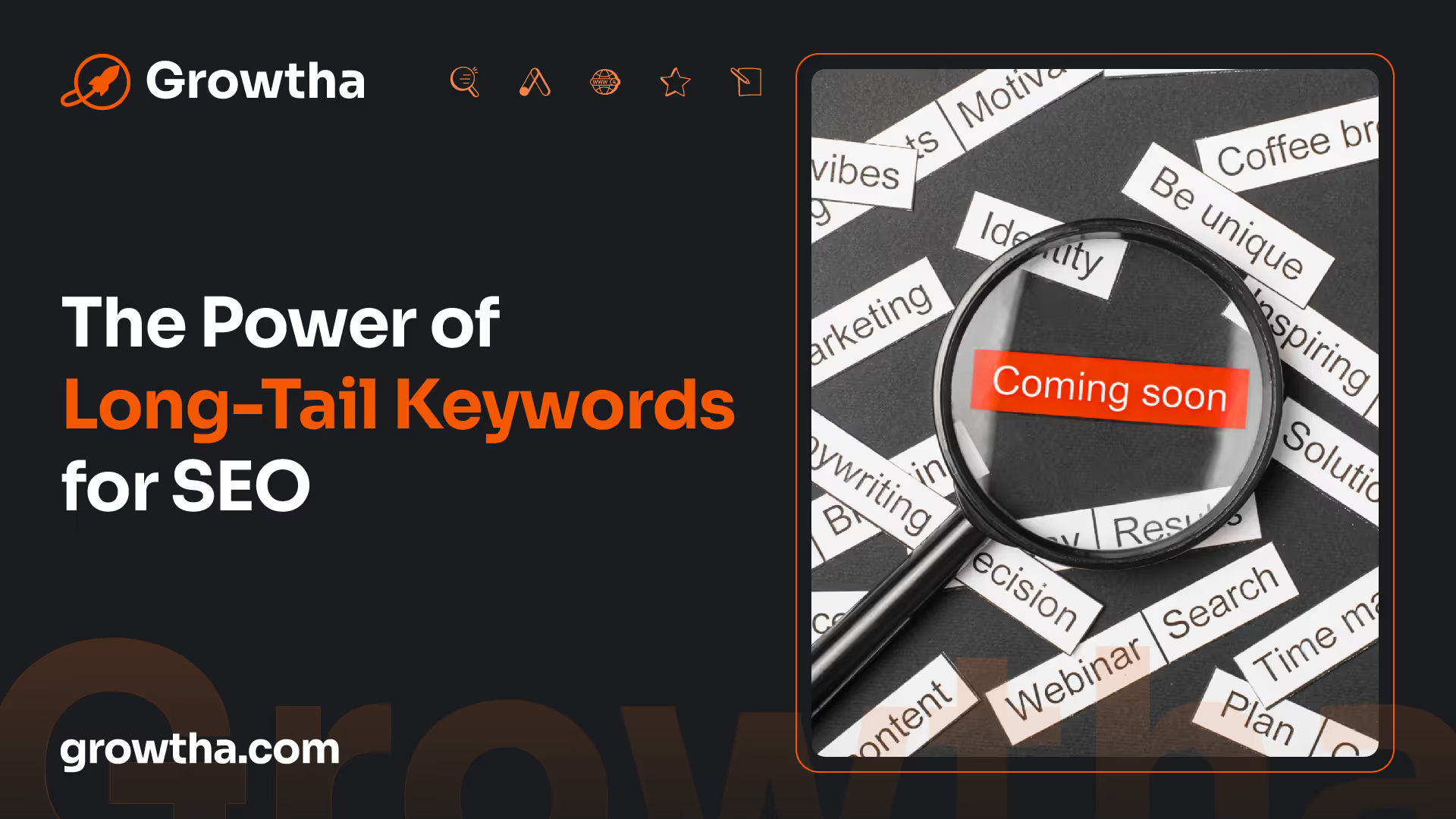Using Long Tail Keywords for SEO
To effectively optimize content for search engines, it's important to understand the concept of long-tail keywords and their benefits.


Using Long Tail Keywords for SEO
Understanding Long-Tail Keywords
To effectively optimize content for search engines, it's important to understand the concept of long-tail keywords and their benefits. This section will explore what long-tail keywords are and the advantages they offer in the realm of SEO.
What Are Long-Tail Keywords?
Long-tail keywords are highly specific search queries that tend to have relatively low search volumes individually, but collectively make up a significant percentage of overall searches. Unlike broad keywords, long-tail keywords are more detailed and specific, often consisting of three or more words. They cater to users who are looking for specific information, products, or services.
For example, while a broad keyword might be "running shoes," a long-tail keyword could be "best women's running shoes for flat feet." The long-tail keyword provides more context and indicates a higher level of intent from the searcher.
Benefits of Using Long-Tail Keywords
Utilizing long-tail keywords in your SEO strategy offers several advantages:
- Higher Conversion Rates: Long-tail keywords tend to attract searchers who are more likely to convert because they are actively seeking specific information or products. By targeting these specific queries, you can reach a more focused audience and increase the likelihood of achieving your desired outcomes.
- Lower Competition and Easier Ranking: Compared to popular head terms, long-tail keywords are typically less competitive, making it easier to achieve higher rankings in search engine results [1]. This allows you to optimize your content for specific search queries and increase your visibility in the search engine rankings.
- Targeted Traffic and Better Search Intent: Long-tail keywords bring in more targeted traffic because they are highly specific. Users searching for long-tail keywords are often closer to making a purchase or converting [1]. By aligning your content with these specific queries, you can attract users who are more likely to engage with your website and take the desired actions.
- Cost-Effective PPC Advertising: Long-tail keywords can result in less expensive Pay Per Click (PPC) advertising because they are highly targeted and have the potential for a higher conversion rate. By focusing on long-tail keywords in your PPC campaigns, you can optimize your budget and increase the efficiency of your advertising efforts.
Incorporating long-tail keywords into your SEO strategy can enhance your website's visibility, attract a more targeted audience, and increase the likelihood of achieving your desired goals. By understanding the power of long-tail keywords, you can make strategic decisions in optimizing your content and improving your overall search engine rankings.

The Power of Long-Tail Keywords for SEO
Long-tail keywords play a crucial role in search engine optimization (SEO) strategies. They offer several advantages that can greatly benefit websites and businesses. Let's explore the power of long-tail keywords in SEO.
Higher Conversion Rates
One of the key benefits of using long-tail keywords is the potential for higher conversion rates. Long-tail keywords are more specific than other keywords, and searchers who use them may be more likely to convert, whether it's making a purchase, filling out a form, or contacting your business. By targeting these specific search terms, you can attract a more relevant audience that is closer to making a buying decision.
Lower Competition and Easier Ranking
Compared to popular head terms, long-tail keywords typically have lower competition. This means that they are easier to rank for in search engine results. For instance, while the head term "sushi" may have a high keyword difficulty of 93%, a long-tail keyword like "sushi sandwich recipe" could have a significantly lower difficulty of 27%. By focusing on long-tail keywords, you can increase your chances of ranking higher in search results and gaining visibility.
Targeted Traffic and Better Search Intent
Long-tail keywords tend to attract more targeted traffic because they are highly specific. People who search for long-tail keywords often have a clearer intent and are closer to making a buying decision. By aligning your content with these specific search terms, you can ensure that you are attracting the right audience to your website. This targeted traffic is more likely to engage with your content and take the desired action.
Cost-Effective PPC Advertising
Long-tail keywords can also be advantageous for pay-per-click (PPC) advertising campaigns. Due to their specificity and lower competition, long-tail keywords can be less expensive compared to high-volume keywords. In addition, long-tail keywords often have higher conversion rates, resulting in a lower cost per click. This cost-effectiveness makes long-tail keywords an attractive option for businesses looking to maximize their advertising budget while reaching a more targeted audience.
Incorporating long-tail keywords into your SEO strategy can bring significant benefits in terms of conversion rates, ranking, targeted traffic, and cost-effective advertising. By understanding the power of long-tail keywords and implementing them effectively, you can enhance your website's visibility, attract the right audience, and achieve your SEO goals.

Strategies for Finding Long-Tail Keywords
To effectively incorporate long-tail keywords into your SEO strategy, it's essential to have a systematic approach to finding these highly specific and targeted keywords. Here are some strategies that can help you identify and utilize long-tail keywords effectively.
Utilizing Keyword Research Tools
Keyword research tools play a vital role in uncovering long-tail keywords that can boost your SEO efforts. While Google Keyword Planner is a commonly used tool, it primarily focuses on paid search data. However, there are other tools available that can provide valuable insights for organic search optimization.
Tools like AnswerThePublic, Semrush, KWFinder, GrowthBar, and more can help you discover long-tail keyword opportunities specific to your niche or industry [2]. These tools provide keyword suggestions, search volume data, and competition analysis, enabling you to make informed decisions about the long-tail keywords you want to target.
Long-Tail Keywords in Different Tools
In addition to the aforementioned keyword research tools, there are several other tools that can assist in finding long-tail keywords for SEO purposes. Some popular options include LongTailPro, SECockpit, Keywords Everywhere, and Google Trends. These tools provide various functionalities such as keyword analysis, search volume trends, and competition insights.
By utilizing a combination of these tools, you can gather comprehensive data about long-tail keywords that are relevant to your website or content. This allows you to make strategic decisions and optimize your SEO efforts based on actionable insights.
Importance of Specificity and Purchase Intent
Long-tail keywords are typically well-thought-out queries that are three or more words long. They are known for their high specificity and purchase intent. These keywords are highly valuable for businesses as they attract more targeted traffic and have a higher likelihood of converting into customers.
When conducting keyword research, it's crucial to consider the specific needs and intentions of your target audience. By understanding what your audience is searching for and the language they use, you can uncover long-tail keywords that align with their search intent. This allows you to create content that directly addresses their queries, increasing the chances of driving relevant traffic to your website.
By focusing on long-tail keywords with high specificity and purchase intent, you can improve the visibility of your website in search engine results. These keywords often have lower competition compared to more general keywords, making it easier to rank for them [2]. This targeted approach can lead to higher conversion rates and more meaningful interactions with your audience.
By utilizing keyword research tools, exploring different tools for long-tail keyword discovery, and emphasizing specificity and purchase intent, you can uncover valuable long-tail keywords to enhance your SEO strategy. Incorporating these keywords strategically into your content can help drive targeted traffic, improve your search engine rankings, and ultimately, boost the overall success of your website.
Incorporating Long-Tail Keywords in SEO
To optimize your website for search engine optimization (SEO), it's essential to incorporate long-tail keywords strategically. Long-tail keywords are highly specific search queries that tend to have relatively low search volumes but can yield significant benefits for your SEO efforts [1]. In this section, we will explore how to optimize your content with long-tail keywords, emphasizing relevance, quality, authority, enhanced ranking, and targeted content.
Optimizing Content with Long-Tail Keywords
When incorporating long-tail keywords into your content, it's crucial to ensure they flow naturally within the context. Avoid keyword stuffing, which can negatively impact the readability and user experience of your content. Instead, focus on integrating long-tail keywords in strategic places, such as the title, headings, meta tags, and throughout the body of your content. By doing so, you increase the chances of search engines recognizing the relevance of your content to specific search queries.
To find the most effective long-tail keywords, utilize keyword research tools that provide insights into search volumes, competition, and related keywords. These tools can help you identify long-tail keywords that align with your target audience's search intent and have a reasonable search volume. By selecting long-tail keywords that are highly relevant to your content, you improve the chances of attracting targeted traffic and increasing your website's visibility in search engine results.
Relevance, Quality, and Authority
When it comes to SEO, relevance, quality, and authority are crucial factors considered by search engines like Google. By targeting long-tail keywords that are more specific, you can create highly relevant content that answers search queries better than other pages. This allows newer or low-authority pages to rank quickly without an extensive backlink profile.
To enhance the quality and authority of your content, it's essential to provide valuable information, insights, and solutions that address the needs of your target audience. By establishing yourself as a reliable and authoritative source, you increase the chances of attracting organic backlinks, which further boost your search engine rankings.
Enhanced Ranking and Targeted Content
By incorporating long-tail keywords in your SEO strategy, you can achieve enhanced ranking and visibility in search engine results. Long-tail keywords are often less competitive than short-tail keywords, resulting in a higher likelihood of ranking well for these specific search queries. According to Search Engine Land, 70% of all web searches come from long-tail keywords, making them a valuable opportunity to target niche audiences and attract highly relevant traffic.
Furthermore, long-tail keywords often already include the short keywords for which you want to rank. This dual impact allows you to boost your ranking for both the main keywords and the specific, targeted ones. By optimizing your content with long-tail keywords, you can attract a diverse range of searchers and increase the chances of converting them into engaged users or customers.
Incorporating long-tail keywords in your SEO strategy not only enhances your ranking potential but also allows you to provide targeted and valuable content to your audience. By understanding the specific needs and search intent of your target audience, you can tailor your content to meet their requirements and establish your website as a go-to resource in your niche.
Why Long-Tail Keywords Matter
In the realm of SEO, long-tail keywords play a significant role in driving targeted traffic and improving search engine rankings. Let's explore why long-tail keywords matter and the benefits they bring to your SEO strategy.
Personalized Search Results
When users search for long-tail keywords, search engines like Google personalize the search results based on various factors such as location, age, sex, and interests. This personalization allows websites optimized for long-tail keywords to cater to different categories of searchers, as these keywords are more specific and aligned with specific user needs.
Reaching Different Categories of Searchers
By targeting long-tail keywords, you have the opportunity to reach different categories of searchers. These keywords are highly specific and reflect the intent of users who are looking for precise information or solutions. By creating content optimized for these long-tail keywords, you can attract and engage users who are more likely to convert.
Boosting Ranking and Faster Results
Search engines rank web pages based on factors such as relevance, quality, and authority. When you target long-tail keywords, you can create highly relevant content that specifically addresses the search terms. This increases the chances of newer or low-authority pages ranking quickly without having a substantial number of backlinks. By focusing on long-tail keywords, you can enhance your ranking and achieve faster results [3].
Dual Impact: Main Keywords and Specific Targets
One of the noteworthy advantages of long-tail keywords is that they often include the shorter, more competitive keywords for which you want to rank. This dual impact allows you to boost your ranking for both the main keywords and the specific, targeted ones. By targeting long-tail keywords, you can achieve visibility for a broader range of search terms, increasing your chances of attracting relevant traffic and potential customers [3].
Incorporating long-tail keywords into your SEO strategy can have a significant impact on your website's visibility, traffic, and conversions. By understanding the importance of long-tail keywords and leveraging their benefits, you can optimize your content and improve your search engine rankings.
References
[1]: https://www.semrush.com/blog/how-to-choose-long-tail-keywords/
[2]: https://blog.hubspot.com/website/best-tools-to-find-long-tail-keywords
[3]: https://www.linkedin.com/pulse/11-simple-benefits-using-long-tail-keywords-seo-saita-%E6%96%8E%E7%94%B0--1f







